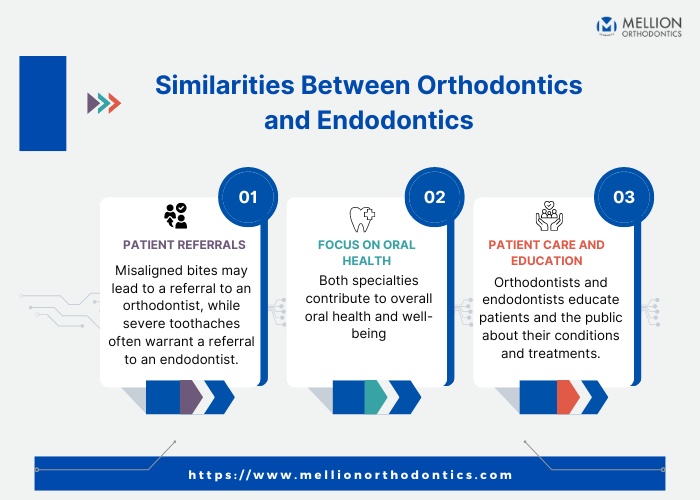The field of dentistry has had major advancements over the years, with specialized field experts attending to specific dental cases. General people who need to become more familiar with dentistry or the different terminologies know one term for their dental help, which is a dentist. Due to that, people might find it challenging to determine who they should seek out for their special oral needs. While we’re mindful that it’s not necessary for one to know all the terms of dentistry, being familiar with the basics surely does help. So, let’s go ahead and expand our world of dental knowledge.
The two frequently mentioned yet the most commonly confused dental specialties are endodontists and orthodontists. The terminology might sound alike, and both play an essential role in enhancing your oral health; they cater to their particular oral needs and treatments. With this blog, our mission is to enlighten our readers on the unique services and oral conditions each treats so that they can make an informed decision and get the proper treatment to keep their smile radiant and healthy.
Chances are, if you’re suffering from tooth decay and visiting your general dentist for a consultation, he/she will refer you to visit an endodontist. An endodontist is a dental professional who specializes in root canal and dental pulp issues. They provide the treatment that’s required inside the tooth- connected to your nerves and gums. Since they focus on the complex tooth problems related to the tooth pulp, they’re also referred to as the root canal dentists.
They use advanced treatment to treat your complex toothache and root issues as they’re dealing with the roots that lie underneath your tooth and gums. Their mission is to care for your damaged or decayed teeth and preserve your natural teeth while relieving you of any pain and discomfort.
The dental issues an endodontist caters to are:
- Tooth decay
- Tooth injuries
- Tooth abscess
- Cracked tooth
What is an Orthodontist?
If you have misaligned teeth and are looking to get your teeth straightened, the dental professional you must go to is an orthodontist. Orthodontics is the specialist in correcting the alignment of your teeth and bad bites to create the perfect straight smile that will boost your looks and confidence. Dealing with the diagnosis of malocclusion and jaw issues to fix the alignment of your bite and positioning of your teeth falls under the expertise of orthodontics. The treatment typically involves using braces, retainers and clear aligners to achieve the desired look.
The orthodontic problems an orthodontist attends to are:
- Overbite- upper teeth protruding out over the lower teeth
- Underbite- lower teeth protruding out over the upper teeth
- Overlapping teeth
- Crowded teeth
- Crooked teeth
- Rotated teeth
- Impacted teeth- partially or fully trapped teeth in the jawbone
- Overbite
And other structural issues
Similarities Between Orthodontics and Endodontics

The difference between endodontics and orthodontics lies in their core specialty and mode of treatment; there are a few similarities that overlap between the two, including:
Patient Referrals
When you go to your general dentists for your regular check-up or because something is bothering you, they often refer you to an orthodontist, an endodontist or even both when specific dental issues require specialized care. If you have issues related to misaligned bites, the dentist will refer you to consult with an orthodontist, while someone with a severe toothache might be referred to an endodontist.
Focus on Oral Health
Both specialties contribute to overall oral health and well-being. Orthodontists and orthodontics treatment not only focus on enhancing the aesthetics of your teeth and smile but it also tackles the bite problems that can impact one’s speech, chewing, and overall quality of oral health. Endodontic procedures and care save teeth from extraction and further dental issues, ensuring patients can maintain a healthy natural dentition.
Patient Care and Education
Orthodontists and endodontists both have a huge responsibility to educate their patients and the general public about their specific conditions and the recommended treatments. They play a crucial role in informing the patients about the course of the treatment, the benefits of treatment, expected outcomes, and the importance of maintaining good oral hygiene during and after treatment.
Difference between an Endodontist and an Orthodontist
On a surface level, endodontists and orthodontists are both dental specialists, but when we dive deep, it is the distinct areas of expertise and different dental care they provide that sets them apart. Here are the key differences between these two dental professionals:
| Checklist | Endodontist | Orthodontist |
|---|---|---|
| Specialization | Specializes with internal structures of the tooth | Specializes in the alignment of teeth and the correction of bite problems |
| Treatment Focus | To treat issues related to tooth pain, infection, and inflammation within the pulp and root canal | To treat issues related to the alignment of teeth, jaws, and bite correction |
| Procedures | Procedures include root canal therapy, endodontic retreatment, and treatment of dental abscesses. | The procedure includes braces, clear aligners, retainers, and platelet expanders to correct the placement of teeth and jaws. |
| Education and Training | Dental school course of four years, followed by an additional two or three years of specialized training in endodontics | Dental school course of four years followed by two or three years of postgraduate training in orthodontics |
| Dental Severity | Minor and moderate cases | Minor, moderate, and severe cases |
| Patient Category | Treats patients experiencing tooth pain and infection/inflamed pulp | Treats patients of all ages in need of orthodontic correction |
Specialization
The first and foremost factor that sets orthodontics and endodontics apart is their specialization. An endodontist is a specialist who deals with the internal structures of the tooth. The treatment primarily focuses on the diagnosis and treatment of dental pulp, root canal-related issues, and problems underneath the gums. They are one we must go to to save our damaged or infected teeth, and they’ll care for your infected teeth with root canal therapy.
Orthodontists are the ones who specialize in the alignment of teeth and the correction of bite problems. Their primary work is to correct the positioning of the jaw and straightening of teeth. The treatments they subscribe to achieve are braces, aligners, and other orthodontic appliances.
Treatment Focus
The second prominent factor in differentiating the two is what their treatments deal with. Endodontists address issues related to tooth pain, infection, and inflammation within the pulp and root canals. The treatment focuses on preserving and saving the teeth by treating the inside of the tooth and its supporting structures.
On the other hand, orthodontist treatment focuses on the alignment of teeth and jaws. They correct issues such as misaligned teeth, overbites, underbites, and crowded teeth to enhance a patient’s oral health, facial aesthetics and overall quality of life.
Procedures
Since endodontists are the experts in internal structures of the tooth, the procedures they perform include root canal therapy, endodontic retreatment, and treatment of dental abscesses. They also deal with traumatic dental injuries affecting the pulp and surgical procedures of the gums.
Orthodontists use various orthodontic appliances to correct the teeth alignment and bite issues, which include braces, clear aligners, retainers, and platelet expanders to maneuver the development and positioning of teeth and jaws. They might also require the assistance of oral surgeons for more complex cases.
Education and Training
To become a specialized endodontist from a general dentist, one has to complete dental school, which typically is a four-year course, followed by an additional two or three years of specialized training in endodontics.
Orthodontists, too, start with dental school, and then they go on to pursue two or three years of postgraduate orthodontic training to be a specialist in orthodontics.
Patient Category
Regarding the patients, an endodontist cares for people experiencing tooth pain, tooth infection, and pulp infection/inflamed issues. Orthodontists, on the other hand, treat patients of all ages- children to adults who require orthodontic correction, be it because of their bite problem, teeth displacement, or for aesthetic purposes.
Which Specialty Should You Go To?
Good oral health is a necessity for all, and it can only be maintained if you get diagnosed and treated for the correct problems by the right specialist. It is not a matter of orthodontist vs endodontist or choosing one over the other. Be it an endodontist or orthodontist, both play an essential role in your dental care, but understanding their area of specialty and treatments is crucial to making an informed decision for your oral health. Seeking the proper medical guidance and care for your needs is essential in getting the right treatments to keep your smile beautiful and healthy.
If you or your child is suffering from any dental issues, make an appointment at Mellion Orthodontics and get the expert treatment right away.

